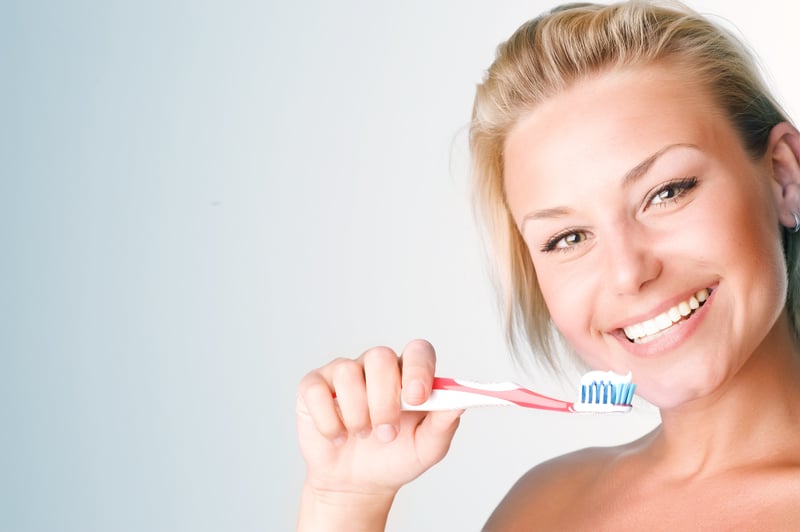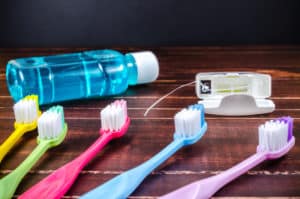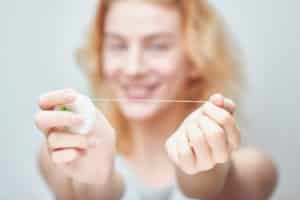Benefits of an Oral Hygiene Routine


Do you brush and floss your teeth each day? Studies show that only about ½ of American adults (or less) are practicing basic oral hygiene habits each day. An oral hygiene routine is vital to keeping your teeth from decaying or falling out over time. Use these recommendations and guidelines for your daily oral hygiene routine and see how you benefit you in the long run!
Oral Health and Oral Hygiene
Your oral health and oral hygiene are almost the same thing, and these terms may be used interchangeably. However, there are some differences in the two. Your overall health is how healthy you are, taking your whole body into consideration. Often, many health problems can manifest in the mouth with various signs or symptoms, or they start in the mouth. Health problems related to weight or poor eating will start with you mouth as you intake food and drink. Diabetes can cause problems with circulation and blood vessels in the body, manifesting physical signs of disease in the mouth. Countless conditions affect the health of your mouth—or your oral health.
However, your mouth can also cause health conditions to worsen, as infections that start in the mouth can get into your bloodstream and make health problems worse. Essentially, keeping your oral health in great condition can help your body stay healthy as well. You keep your oral health in check through oral hygiene—or how you care for the mouth. Those oral hygiene steps include brushing and flossing your teeth, keeping your tongue clean, using decay-fighting oral products, and visiting the dentist. All of those steps can help kill germs and bacteria that would make you sick and that would cause disease in your teeth and gums over time.

Why Is Your Oral Hygiene Important?
Gum disease and tooth decay are among the most common chronic conditions in the U.S. The National Institutes of Health report that tooth decay—what you know as “cavities”—is the most chronic disease among American adults and children. More than 92% of people have cavities by the time they are adults, and many have untreated tooth decay they don’t know about.
Cavities are bad because once a part of your tooth decays, you can’t simply reverse it. You have to have a dentist remove the decayed part and fill it with new material. When cavities grow large, they go through the several layers of the teeth to the tooth center. This will cause rapid decay and infection where the nerves and blood vessels lie. When decay reaches this point, it can make you lose your tooth.
Gum disease is also a serious disease that more than 64.7 million American adults. That’s not even including children. When you don’t brush or floss your teeth, sugars in your food will mix with mouth bacteria to make a sticky, acidic film. That film is plaque and it sticks to your teeth, using its acid to break up minerals in your teeth. This decays your teeth and thins them, and the acidic plaque will irritate your gums. Early gum disease is when your gums become swollen and inflamed (with a darker red tint). When oral hygiene habits don’t improve, your gums will become irritated enough that the gums recede, eventually causing mushy gums and tooth loss. Good oral hygiene habits can prevent all of these problems.
Brushing 101
Brushing your teeth is one of the best oral hygiene habits you can have. Patients should buy a toothbrush that fits the size of their mouth. Use soft gum brushes for infants and infant toothbrushes for toddlers. Children will have smaller toothbrushes with smaller heads and adults will have larger toothbrushes with larger heads. Change out these toothbrushes every 3 months or when the bristles become frayed.
To brush, patients should use toothpaste enriched with decay-fighting fluoride. Use a rice-sized amount for infants, a pea-sized amount for children and slightly more for teens and adults. Wet the toothbrush, add toothpaste and brush all tooth surfaces for 2 minutes. Go in all different directions, circles and 45-degree angles. Brush for 2 minutes every time you brush, at least 2 or more times a day, as recommended by the American Dental Association. Brush your infant or child’s teeth until they are old enough to do these themselves, and then monitor that brushing.

Flossing, Mouthwash and Fluoride
Brushing is not complete without flossing your teeth. Floss 1-2 times a day (minimum), using new floss each time. You need about 18 inches of floss that you wind between your pointer or middle finger on each hand. Floss up into your gum line between each tooth and scrape the teeth as you floss to remove extra plaque.
Mouthwash and fluoride products can benefit your oral hygiene routine. Mouthwash can kill bacteria that would cause you decay or disease. It can freshen breath and those with fluoride can help protect your teeth from losing minerals. Fluoride is a naturally-occurring mineral that help provide a barrier for teeth against bacteria. Your teeth loose minerals from acid-containing foods and drinks, but they also gain minerals from foods and drinks. Fluoride will help protect against that demineralization and can make your teeth stronger.
Schedule Your Dental Visits
Another major oral hygiene consideration you want to make is scheduling dental visits. Only a dentist can detect tooth decay with their professional technology. Biannual visits prevent large tooth decay and a dentist can help reverse your gum disease when it starts. They also have treatments for severe decay or disease that has already happened. If you want to avoid oral health diseases that can harm your health and can make your teeth fall out, you definitely want an oral hygiene routine. You’ll not only feel like you have a healthy, fresh mouth, but your smile will be more beautiful and your mouth structures stronger. To see how your oral hygiene and health is doing, call Dr. Ania’s office today at 303-443-0998 for your comprehensive exam!


